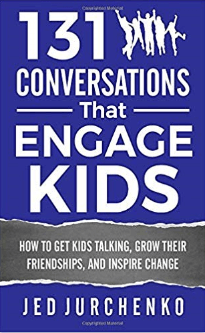Create an Environment of Openness
So this is my little boy —doctor in training —equipped with mom’s purse and dad’s stethoscope. Just before sixth grade I overheard heard him and his friends talking about something that seemed a little bit sexual. After confirming with my wife we decided Max and I were going to have “the talk.”He and I sat down at the dinner table, and I taught him the birds and the bees. After the discussion, we watched a prescreened age-appropriate video from YouTube. He asked me a few questions. Afterward, I said this, “Max, I do this for a living. You can ask me anything. I talk about this stuff all day. Anything you want to know, just come and ask me, but Max, I don’t want you to share this with your friends. They need to learn from their parents. The things we learned tonight stays between us..” Max looked me dead in the eye with the most serious face a 10-year-old can make. He said, “Dad, you don’t have to worry because I NEVER want to talk about this again.”
Engagement
How do we create an environment of openness?—through engagement. Discussing sex and healthy relationships is not a one-time thing. This is not sitting down and reading a book or watching a YouTube video. This is an ongoing conversation and an ongoing dialogue.
We want our children to want to talk to us. I love it when my children talk to me. We want to build that type of communication style in our families. Little things work. Try and sit together at mealtime and talk. Turn the TV off. No Phones or devices. Sit, eat, talk and be present in the moment. Build this culture in your family. My wife and I started using note cards with handwritten thought-provoking questions that we pull out at restaurants. The kids rolled their eyes at first, but now they look forward to it. Some of the questions are fun and silly and others are more philosophical. One family member pulls out a card and then we go around the circle each answering. It is a conversation starter and brings the family together.
Give them your full attention
When your kids ask you a question give them your full attention. Put the phone down. Look them in the eye. Square your body to them. These are subtle clues that communicate to your child that you are fully engaged. This teaches your child that they are your priority. They matter. Their words are important. Now, what if your kid asks “Daddy, where do babies come from?” You need to be prepared. If you giggle, smile, cough or make an excuse to go to the bathroom, you have inadvertently communicated a lot to your child about sexual discussions. You’ve taught them that it’s embarrassing and may even be dangerous and scary. This is the opposite of what we want. Creating an environment of openness can be hard, but it is important. Whenever your child asks a question then you must be open and ready to talk.
Prepare for the test
Think of the Birds and the Bees talk, as a test that you have to study for. The cool thing is you already know all the test questions. Make a list of things kids may ask. So as a practice run here’s your first question:
“ Where do babies come from?”
Answer that question out loud right now. Don’t just think it because your brain won’t process it….I will wait…… I suspect you are now just staring at the screen and frozen unable to go to the next sentence. ….. If you try and answer this question out loud without practicing what you’ll find is there stammering, there’s stuttering, the answer is a confusing mix of medical language and childhood slang. Your initial answer it likely super awkward. You cannot get this right on the first try. You must practice. When you get home tonight, ask your spouse this question.
“Why do people have sex? “
See if they can answer it. My guess is the answer will be weird and awkward. It’s not going to sound right.
To all the dads reading this… what are you going to say when your daughter asks:
“Why do girls get a period?”
“What does it mean when you have a period?”
“What do I do when I have a period?”
You want to be able to talk about these questions. You don’t want talking to you to be scary. You don’t want it to be shameful. If you are embarrassed then your child will sense it. You want to be open. The only way to do that is to practice. And I promise, one day they will ask.
Teenagers may ask much harder and sometimes philosophical questions. You and your partner should practice these and make sure you are on the same page. Here are a few questions to get you started:
“What is puberty?”
“When is it OK to have sex?”
“Why should I wait until marriage?”
“How do you know when you are in love?”
Show vulnerability to create openness
No one knows all the answers. That is ok. We often feel like we are supposed to be the all-knowing parent. If your child asks a question and you do not know the answer do not fake it. Just say, “ I don’t know. Let’s find out together, let’s Google it. “ When you show vulnerability, you breed trust. It is powerful when you say to your child “I don’t know.” It’s not a moment of weakness. Instead, you have taught your child that their questions are important and challenging. They will respect you and trust you more because you said, “I don’t know, let’s go find out together.”
Make sure and subscribe so you can continue to receive the next post.
Further Reading:












